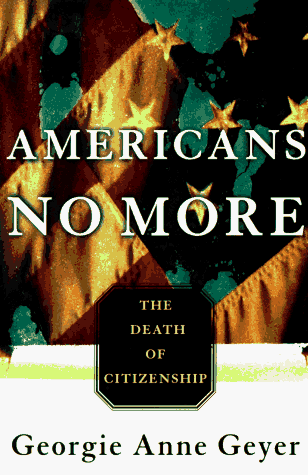Georgie Anne Geyer is no stranger to the immigration issue. For years her syndicated columns have included spirited criticism of efforts toward the redefinition of American identity. They have attacked what Geyer calls the “citizenship mill,” the thoughtless naturalization of masses of Third World residents (not all of them legally in the United States), bilingual education, and the increasingly weird expressions of multiculturalism. Taking relentless aim at these targets, her book features mindboggling accounts (worthy of Sam Francis) of such enormities as publicly financed celebrations of Aztec deities in municipalities that also ban Christmas displays, and the extension of voting rights to illegal Marxist immigrants in Tacoma Park, Maryland. Geyer throws light on the extent to which naturalization is a political ploy, used to increase the electoral strength of those groups who work to have it expanded. She exposes the reasoning of liberal immigration expansionists by citing them directly. In one particularly revealing comment, Doris Meissner, Commissioner of the INS, explains that “Naturalization helps counteract anti-immigrant attitudes” and should therefore be “promoted.” Geyer does not cite an even more outrageous statement quoted by Peter Brimelow in Alien Nation, by Earl Raab, director of Brandeis University’s Institute for Jewish Advocacy, according to whom we should welcome the prospect that “Half of the American population will soon be non-white and non-European. We have topped the point when a Nazi- Aryan party will be able to prevail in the country.”
Despite her underscoring of the problem that Americans are no longer citizens in their own country, Geyer might have done more to set this problem in its proper context. While Chilton Williamson and Wayne Lutton have explained the historical process by which we have reached the point described by Geyer, Americans No More barely touches on the real reasons for a changing and denatured American identity. All too often the author falls back on neoconservative commonplaces uttered by invariably “brilliant” scholars. However, contrary to what Geyer may have been told, Max Lerner was not a distinguished historian but a journalist; Bruce Fein is a neoconservative columnist and lawyer, not a legal scholar, etc. Nor are the remarks she heard William Bennett and other neoconservative luminaries deliver at Washington conferences worthy of respectful note. They do not illuminate the background of our current liberal notion of citizenship.
Geyer quotes approvingly another icon of neoconservatism, Abraham Lincoln, who spoke on the changing composition of the American Republic in an Independence Day speech in 1858, without grasping the cultural context of his words. Though Lincoln was struck by the fact that most of those then living in the United States could not “trace connection with those days [of the founding] by blood,” he insisted that they could return to that “glorious epoch” by embracing the principles of the Declaration of Independence, “the father of all moral principle.” At least as striking as Lincoln’s appeal to the Declaration is his sense that the “ethnic history” of the early republic had been broken. Like Ralph Waldo Emerson and other Eastern Republicans, Lincoln believed that the United States was significantly different in its ethnic composition from what it had been 70 years earlier. Yet that republic, still predominantly Northern European and Protestant as well as heavily rural, continued to enjoy what John Jay in Federalist 2 considered one of the special advantages of the American Republic: being “a people descended from the same mentors, speaking the same language, professing the same religion, attached to the same principles of government.” Obviously Lincoln, who planned to send manumitted slaves back to their ancestral continent, believed there were cultural limits to how far citizenship could reasonably be extended. Opposition to slavery, for Lincoln and some other Republicans of his time, did not signify a dedication to a modern “inclusive democracy.”
Since then, the United States has changed dramatically in its ethnic and political character. It is not the same country it was in the mid-19th century, having lost the ethos that once defined it as a cultural and constitutional nation. As Aristotle pointed out, a regime does not stay the same by virtue of occupying the same place for several generations, if the original people have been displaced by another. In the case of the U.S., the displacement has been twofold: first, Americans tolerated the arrival of peoples increasingly different from the founding stock; next they transformed themselves in ways that would have made them alien to their own ancestors. In time they lost their cultural understanding of “democracy” and “constitutional government,” in wavs that Geyer actually applauds since these have done away with sexism, racism, and other forms of parochialism. Geyer perceives that the consent of those already here is no longer required for the acceptance of culturally bizarre and impoverished applicants for American jobs, and American citizenship. Yet she fails to note sufficiently the changing meaning of the word “democracy,” which refers no longer to popular self-rule but has become synonymous with socialization and political management. One cannot fully understand the breakdown of consensual citizenship without taking into account the nature of managed mass democracy. The “death of citizenship” is not an abuse to be corrected by advocacy journalism and seminars on the virtues of Lincoln. It is the inevitable byproduct of the managerial revolution applied to popular government, and it represents a problem now confronted by even vestigially Western peoples.
[Americans No More: The Death of Citizenship, by Georgie Anne Geyer (New York: Atlantic Monthly Press) 352 pp., $23.00]

Leave a Reply